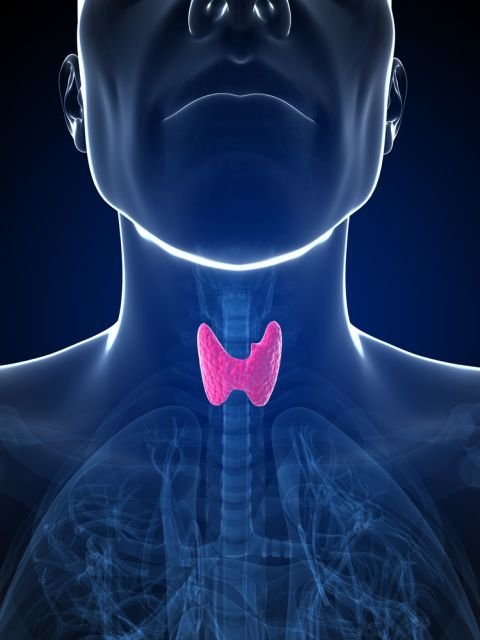
Thyroid gland – an article by Jacek Kucharski
The thyroid gland has a great influence on the quality of our lives. Most processes are directly or indirectly controlled by this gland. What is based on my experience is the fact that the functioning of the thyroid gland is closely related to nutrition.
The quality of our diet can help or disturb the functioning of the gland. A hair tissue mineral analysis shows problems with the gland long before it could be diagnosed in blood.
The level of hormones in blood show a problem when the problem is prolonged and advanced. We are able to find a problem with our thyroid ourselves: we feel alternating hot and cold, our skin feels dry, our organisms keep water, we put on weight eating almost nothing or we cannot put on weight eating a lot, we suffer from constipations or acne etc., there are plenty more of other symptoms.
In a hair tissue mineral analysis the thyroid gland is characterized by the ratio of calcium to potassium. Calcium slows down the pace of work of the thyroid. HTMA high in calcium indicates acidification of the organism. Hence, all actions to deacidify will accelerate the work of the gland.
The second element in HTMA which is worth mentioning is the content and the ratio of iodine to selenium. Those two minerals describe the function of the thyroid hormone. Taking supplements with both of them should be always preceded by HTMA. We should never take only one mineral, but the dose should be fixed basing on the amount of the two in tissues. They both protect the organism against toxins and people with toxins in their organisms will never know what is the real level of the minerals. Selenium protects our organisms against, among other things, mercury. Iodine is often lowered by dioxins (exhaust fumes), hence, I do not see the appropriate level of this mineral in analyses of people living by our sea.
Diet, nutrition state and lifestyle are all significant in functioning of the thyroid gland, even when there are no symptoms of its dysfunction.
What in a diet changes the proper function of this gland:
Broccoli, cauliflower, Brussels sprouts, especially those half-cooked reduce the thyroid function. The same happens when we eat: radish, rutabaga (swede), peanut, spinach, mustard. In those products there are natural goitregenic compounds of different acting. This does not mean we should get rid of those foods, they contain a lot of healthy constituents, but it is not advised to consume them too often and in great amounts.
Phtalic acids, phenols, aliphatic and aromatic hydrocarbons, sulfur compounds, nitrites, erythrosine, perfluorooctanoic acid, excess of Mo, Mn and F (use toothpastes without fluoride), presence of Hg, Pb, Cd, As, Sb, Sr have a similar influence.
Additionally, other reasons for reducing thyroid function may be: excessive consumption of millet, deficiency of vitamins A and D, excess od vitamin E, protein-caloric malnutrition (unbalanced diet, low-fat diet). Oats auxins inhibit the secretory activity of the thyroid.
A lot of medicines reduces thyroid hormones synthesis or increases their metabolism, therefore, people with thyroid disorders and taking a lot of, or often, medicines should consult a good doctor. The most harmful are: amiodarone, beta-blockers, thyrostats, lithium carbonate, barbiturates, phenytoin, diuretics and other.
Bromine in dairy products inhibits iodine. Especially processed dairy products, except for goat’s milk and of own breeding, which are not contaminated with this element.
Hyperestrogenism reduces thyroid function. For this reason, it is a serious mistake to practise contraception unless it is suggested by a doctor. You should avoid estrogen-like compounds: oregano, sesame, ginseng, licorice, angelica, soya (contains compounds which deactivate iodine and other), drinking water from plastic and using soft plastic packaging (they contain: Bisphenol A, Sb, cesium), meat from fattening industry. We should also reduce excess body fat, because it produces estrogen. I am writing here about excessive body fat of course as its deficiency is also harmful.
To reduce the level of estrogen we can exercise properly every day (proper time and intensity). We can also take dandelion or European karabieniec (Lycopus europaeus), which apart from working anti-TSH has also anti-gonadotropin properties. Hence its action inhibiting secretion of prolactin.
If we would like to reduce the level of estrogen in a diet, we should:
- consume pumpkin seeds after 3 p.m., add ground seeds to soups (they contain zinc and are anti-parasitic)
- drink green and white tea with ginger root and cardamom, sweetened with xylitol or stevia, rooibos tea (not bagged tea) and Honeybush (before going to sleep)
- consume vegetables from the nightshade (Solanaceae) family: eggplant, dried tomatoes, pepper, potatoes (2-3 times a week), Chinese wolfberry and from the lily family (onion in soups, raw till 2 p.m.)
- consume pears, currants, figs, drink red dry wine, fruit, juice from sea buckthorn, sun-dried apricots, pomergranates (juice, fruit), goji berries, akka, mango
- consume Roman cumin, onion, lovage, marigold flowers tea, cherries, cabbage and lettuce, which are capable to boost thyroid function
- consume coconut fat in your diet and ghee butter, fats that have a thermogenic effect, which stimulates the organism to increase Basic Metabolic Rate (BMR)
- include kelp, dulse (Palmaria palmata), wakame, rosemary, beans, berries: goji, Canadian, Kamchatka, Inca golden berries, cress, Schisandra, rutabaga, turnip, Yam, Matzo, tarragon, red-root pigweed (Amaranthus retroflexus)
- remember that natural progesterone restores thyroid function and other endocrine glands (yam cream)
- remember that bladderwrack stimulates thyroid function, increases metabolism (oxidation of fats and sugars), reduces body mass, dilates blood vessels narrowed by stress, lowers high blood pressure, regulates bowel movements, has antiseptic, diuretic and cholagogic properties, eliminates swelling, has rejuvenating, regenerating and smoothening the skin effects, is strengthening and anti-artheroscrelosis. It can be used internally or externally (oil poultices) as oil macerates.
Research carried out in Switzerland shown that smoking intensifies hypothyroidism symptoms.










Comments No Comments
Join the discussion…